
Latest News Regarding
Horn of Africa
Sudan: Protesters demand military rule amid tough economic reforms and political crisis
Sudan: Protesters demand military rule amid tough economic reforms and political crisis
Source: Middle East Eye, 17 October 2021, Thousands marched in Khartoum calling for Prime Minister Abdalla Hamdok to dissolve civilian-led government

Sudanese protesters demonstrate outside the presidential palace in Khartoum on 16 October 2021, demanding the dissolution of the transitional government (AFP)By MEE and agenciesPublished date: 17 October 2021 12:09 UTC | Last update: 5 hours 2 mins ago
Sudan is grappling with the biggest political crisis in its two-year transition to civilian rule, following a massive demonstration on Saturday that brought thousands of pro-military protesters to central Khartoum, demanding the government to be dissolved.
The military and civilian groups have been sharing power in the east African country in an uneasy alliance since the toppling of long-standing President Omar al-Bashir, who was ousted by the army in April 2019 following weeks of mass protests.
‘I am not neutral or a mediator in this conflict. My clear and firm position is complete alignment to the civilian democratic transition’
– Sudanese Prime Minister Abdalla Hamdok
Saturday’s protest was organised by a splinter faction of the Forces for Freedom and Change (FFC), a civilian alliance which spearheaded the anti-Bashir protests and became a key plank of the transition.
Outside the presidential palace, the protesters chanted: “We will stay put where we are… we want the dissolution of this government.”
Saturday’s protest comes after Prime Minister Abdalla Hamdok on Friday unveiled a road map to end what he described as the country’s “worst and most dangerous” political crisis in its two-year transition.
Groups advocating for civilian rule have called for protests on Thursday 21 October.
‘Bring us bread’
Support for the transitional government has waned in recent months in the face of its tough economic reforms, which have included the slashing of fuel subsidies and a managed float of the Sudanese pound.
Inflation has skyrocketed, reaching 422 percent in July, before easing slightly in August and September.
Hamdok, a former UN economist, has been facing calls to dissolve his government following the International Monetary Fund’s (IMF) approval of a $2.5bn loan and debt relief agreement that would see Sudan’s external debt reduced by some $50bn.
However the harsh reforms have hit the pockets of many Sudanese who are now struggling with poverty, shortages of medicines and power cuts.Sudan protesters demand government resign over IMF-backed reformsRead More »
On Saturday evening, demonstrators set up tents outside the presidential palace and chanted “one army, one people” and “the army will bring us bread”.
Abdelnaby Abdelelah, a protester from the eastern state of Kassala, told AFP that the government has overlooked other states beyond Khartoum. “We want a government that knows about the things going on in the east,” he said.
“We are marching in a peaceful protest and we want a military government,” added Enaam Mohamed, a housewife.
The current government has failed to bring the people “justice and equality”, said 50-year-old Abboud Ahmed, who wants the military to be in charge.
The IMF-mandated reforms so far have caused food and transportation costs to surge, forcing Sudanese people to make sacrifices.
Since September, demonstrators in eastern Sudan have blocked trade through the key hub of Port Sudan.
On 21 September, the government said it thwarted a coup attempt and placed the blame on sympathisers of the Bashir regime, which was dominated by Islamists and the military.
Daunting challenges
Since a coup attempt in September, Sudan’s military and civilian power-sharing partners have been locked in a war of words, with military leaders demanding the reform of the cabinet and ruling coalition. Civilian politicians accused the military of aiming for a power grab.
“The coup attempt opened the door for discord, and for all the hidden disputes and accusations from all sides, and in this way we are throwing the future of our country and people and revolution to the wind,” Hamdok said in a speech on Friday.
Hamdok described the current conflict as not between the military and civilians but between those who believe in a transition towards democracy and civilian leadership and those who do not.
“I am not neutral or a mediator in this conflict. My clear and firm position is complete alignment to the civilian democratic transition,” he said.
Nevertheless he said he had spoken to both sides, and presented them with a road map that called for the end of escalation and one-sided decision-making and a return to a functioning government.
He emphasised the importance of the formation of a transitional legislature, reform of the military, and the expansion of the base for political participation.Sudan: Large protests against military rule reflect deepened political crisisRead More »
Referring to an ongoing blockade of the country’s main port in the East of the country by protesting tribesmen, Hamdok described their grievances as legitimate while asking that they re-open the flow of trade. He also said an international donors’ conference to benefit the region was being organised.
The mainstream faction of the FFC said: “The current crisis is not related to dissolution of the government or not.
“It is engineered by some parties to overthrow the revolutionary forces… paving the way for the return of remnants of the previous regime.”
As tensions have risen, a number of international envoys have rushed to visit the country in order to ease the strains between the military and civilian leadership.
Earlier this month, a United Nations source disclosed that Volker Perthes, special representative of the UN Secretary General for Sudan, has been in Khartoum to undertake a series of meetings with civil and military officials in the transitional government.
However some Sudanese analysts have played down international involvement, saying the only way to protect the transition and democracy was through the people of Sudan who had made the revolution.
China provides humanitarian aid to Somali
China provides humanitarian aid to Somalia




Source: Xinuanet, Sunday October 17, 2021
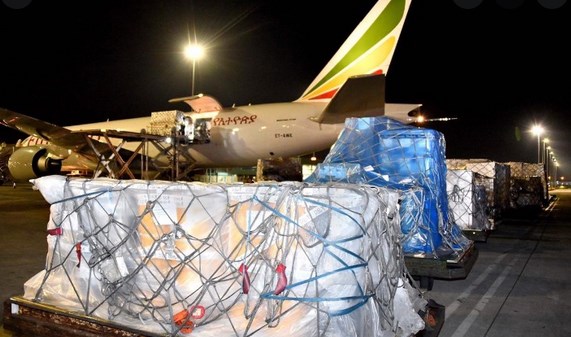
China on Saturday donated a batch of humanitarian assistance to Somalia amid flourishing bilateral ties.
Fei Shengchao, Chinese Ambassador to Somalia, said the humanitarian supplies from China included 10,000 tents, 50,000 mosquito nets, 20,000 aid kits and baby weight scales, stethoscopes and thermometers.
“The pandemic has taken its toll on humanitarian support worldwide. For these supplies, the cost of production has gone up 15 percent and the cost of shipment has soared seven times,” Fei said in a statement issued in Mogadishu.
advertisements
The Chinese government has delivered the aid despite the rising cost of production and shipment. Fei said that is the Chinese way of helping others.
The ambassador added that China and Somalia are well-known for their compassion for each other and for their resilience at difficult times.
Somalia’s Minister of Humanitarian Affairs and Disaster Management Khadijo Mohamed Diriye thanked the Chinese government for providing the humanitarian assistance, saying it came at a very critical moment.
“Somalia thanks China for its constant role of support to its Government and people in the very dire situation that they’re facing. We received different equipment of humanitarian assistance from our brotherly nation,” Khadijo said.
The humanitarian assistance from China was delivered at a time Somalia was reeling from droughts, floods and locusts invasion.
Somaliland Minister calls forced expulsion a law enforcement operation
Somaliland Minister calls forced expulsion a law enforcement operation




Source: Hiirasan Online, Friday October 15, 2021
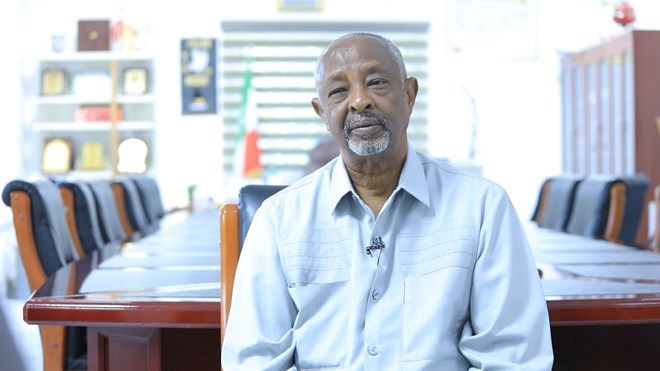
Hargeisa (HOL) – Somaliland’s Interior Minister Mohamed Kahin Ahmed described an operation to expel non-Somalilanders from Sool and other regions as a ‘law enforcement operation.’
Minister Kahin, a guest on Horn Cable’s Hal-adayg program, was asked if the Somaliland government would apologize to the deportees if the security situation in the Sool region did not change.advertisements
Kahin described it as an operation in line with Somaliland immigration law targeting foreigners.
“These people have been repatriated to Somalia; they have not been violated. The nature of our situation here is affected by the laws of Somaliland. As a minister, I cannot cross the Tog-Wajale border without a visa from the Ethiopian government. I cannot enter Djibouti without the proper documentation. We follow these rules all over the world.
The minister said that Somaliland and Somalia are two separate countries, and therefore, the evictions are classified as deportations.
“The local community called on their authorities to act. They asked for us to remove non-Somalilanders, and we have complied. We did not hurt anyone in the process of the deportation; they were just repatriated to their lands.”
So far, an operation has been announced in Sool, Sanaag and Sahil regions to deport Somalilanders, while in Hargeisa, police are conducting operations to repatriate Ethiopians.
Diversity, a ‘source of strength’, UN chief tells Security Council
Diversity, a ‘source of strength’, UN chief tells Security Council

Source: UN news center, MONUSCOPeacekeepers celebrate International Day of Peace in a village in South Kivu, Democratic Republic of the Congo. 12 October 2021Peace and Security
Inclusion is fundamental to rebuild societies in the wake of war and achieve durable peace, UN Secretary-General told world leaders, ambassadors and prominent global citizens meeting in the Security Council on Tuesday.
The UN chief addressed an open debate on diversity, statebuilding and the search for peace, organized by Kenya, which holds the rotating Council presidency this month.
“For countries emerging from the horrors of conflict and looking to a better future – indeed for all countries – diversity must not be seen as a threat. It is a source of strength,” the Secretary-General said.
Inclusion and participation
Stressing that” peace is not found in a piece of paper”, but in people, the UN chief spoke of how inequalities and weak governance can create the space for intolerance and extremism to grow, which can spark violent conflict. Inclusion has the opposite effect.
By opening the door to inclusion and participation, “we take a giant step forward in conflict-prevention and peacebuilding,” he said.
“As countries look to build sustainable peace, they need to include and involve all segments of the population in the process of rebuilding communities and sustaining peace,” he added.
The meeting, chaired by Kenyan President Uhuru Kenyatta, was held because most situations on the Security Council’s agenda arise from internal conflicts in which identity issues—whether ethnic, racial, religious or socioeconomic–play a part.
Rwandan President Paul Kagame, former South African President Thabo Mbeki, as well as the first woman Deputy Speaker of Afghanistan’s Parliament, Fawzia Koofi, were among those briefing.
Promote human rights
The Secretary-General emphasized three areas for action, beginning with ensuring national institutions and laws work for all people, through protecting and promoting human rights.
“It means implementing policies and laws that protect vulnerable groups — including laws against discrimination based on race, ethnicity, age, gender, religion, disability, sexual orientation or gender identity,” he said.
Move people forward
Countries emerging from instability cannot afford to ignore the views of entire segments of their populations, which could fuel future resentments, the UN chief warned. Instead, they should explore ways to give greater voice to subnational regions.
“Governments must find ways to move people forward together, as one, through constant dialogue – recognizing and respecting differences – even if this means devolving some areas of authority,” said Mr. Guterres, speaking in French.
UN operations on the ground, he said, work to keep dialogue open and flowing between state institutions and local populations “so that everyone can have a hand in shaping their country’s future.”
Women and youth essential
For his third point, the Secretary-General stressed the importance of including women and young people because “building and sustaining peace requires their voices and actions.”
This is something which UN peacekeeping operations and special political missions strongly emphasize, he said.
For example, the UN mission in Somalia, UNSOM, has trained budding politicians from different political parties in the country. It also supported the authorities and women leaders in implementing a 30 per cent gender quota in national elections.
“As a global community, we must continue encouraging and supporting the full and active participation of women and young people in this journey,” the Secretary-General said.
Afghan women want inclusion
With Afghanistan back under de facto Taliban rule, women and girls are now regarded as second-class citizens, said former leading parliamentarian, Fawzia Koofi, adding, “literally, they are making us invisible again.”
As gender equality is among the 17 Sustainable Development Goals (SDGs), she said political processes, structures and working methods must be more responsive to women’s needs.
“In Afghanistan, for example, we want direct and face-to-face talks with the Taliban,” she told the Council. “You can include us in your own mediation teams. You can also facilitate a meeting of a delegation of our women with the Taliban. We want to do it for our sisters back home.”
Emotions and negotiations
In his address, President Kagame of Rwanda underscored how peacebuilding is an ongoing process. While it will be impossible to prevent all conflicts, their intensity and impact can be minimized by remaining attentive to local needs and expectations.
“This means investing in the capacity of institutions and individuals so they can deliver the results that citizens expect and deserve,” he said.
Peacebuilding is also not purely technical but deeply political and human, he further stated, and consideration must be given to the emotions and memories that various parties bring to the negotiating table.
“Multilateral organizations such as the United Nations and the African Union have a central role in many situations. Civil society groups, particularly those led by women also have a key role, as do business leaders.”
Fighting hate speech
President Kenyatta of Kenya offered several recommendations for the international community, which included reviewing whether global institutions currently are “fit for purpose” in building a more inclusive world.
He also called for governments, the UN and social media companies to collaborate on combating hate speech and incitement.
“This can include an agreed global code of conduct by companies, and the development of early warning tools to detect escalation trends and facilitate pre-emptive measures,” he said.
Kenya’s President also looked to the COP26 climate change conference in November, saying it provides an opportunity to ensure adaptation commitments will accelerate development, investment and job creation.
“Climate adaptation must offer a clear and viable path to a green industrialisation for Africa and the Global South,” he said.♦ Receive daily updates directly in your inbox – Subscribe here to a topic.
BREAKING: ICJ rules overwhelmingly in Somalia’s favour in landmark maritime dispute
BREAKING: ICJ rules overwhelmingly in Somalia’s favour in landmark maritime dispute




Source: Hiiraan Online, Tuesday October 12, 2021
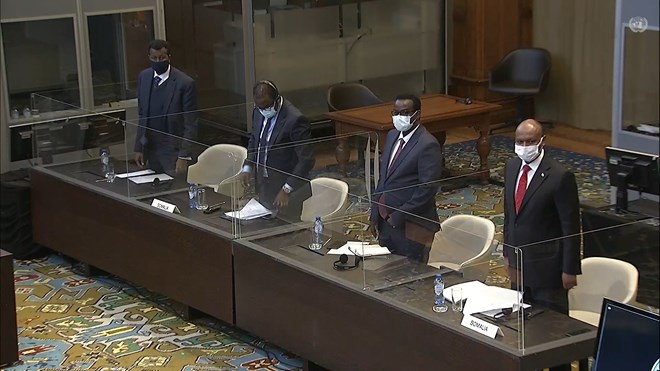
Mogadishu (HOL) – The UN’s top court has ruled overwhelmingly in Somalia’s favour in a bitter seven-year maritime dispute against its neighbour Kenya on Tuesday.
In its judgment read by the presiding judge at ICJ, Joan E. Donoghue, the court granted Somalia most of the territory that it had claimed.
advertisements
Oil and gas speculators believe that the 62,000 square mile area is potentially rich in hydrocarbons.
A fifteen-judge panel of the International Court of Justice (ICJ) rejected Kenya’s claim that there had been an agreed maritime boundary with Somalia and ruled that the maritime border should run on equidistant or on a median line as suggested by Somalia.
The ICJ ruled that contrary to Kenya’s assertations, there was never a formal agreement with Somalia regarding their maritime boundaries. Furthermore, Kenya did not consistently maintain its supposed boundary claim.
“The court unanimously finds that there is no agreed maritime boundary between the Federal Government of Somalia and the Republic of Kenya that follows that parallel of latitude.”
“Kenya has not consistently maintained its claim that the maritime border with Somalia is defined by the line of latitude between the two side,” said Judge Donoghue.
Kenya argued that a 1979 decree by former President Daniel Arap Moi was proof that it has always maintained its border as a parallel line. It says that since then, it has exercised sovereignty in the EEZ territory it claimed.
The Court pointed to the 2009 MOU with Somalia – which acknowledged a boundary dispute – and subsequent meetings as explicit evidence that both sides recognized that a resolution was not met.
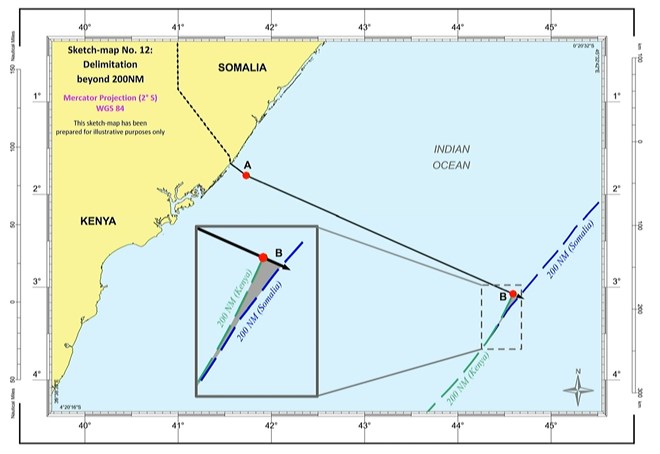
The ICJ has dismissed Kenya’s claim to a parallel latitude (horizontal) boundary. CREDIT: ICJ
The ICJ also found that Kenya entered into negotiations with the Somali government in the 1980s, which ended inconclusively, further proving that it has not been consistent on its maritime border claims.
The Court said that it could not ignore Somalia’s 30-year civil war. Its government inaction during that period cannot be interpreted as de facto acceptance of Kenya’s border claims.
The Court also rejected that Kenya’s security claims warranted an adjustment of the equidistant line.
The Court said that it was not convinced by Kenya’s argument that the new maritime boundary would have catastrophic effects on the livelihood and economic wellbeing of Kenyan’s.
“17 of the 19 fish landing sites are located in the Lamu archipelago and would therefore be unaffected by the equidistant line.”
Somalia immediately welcomed the result.
“Congratulations to the Somali people, we have succeeded in securing our seas,” Somalia’s minister of information, Osman Dubbe, tweeted.
Dubbe thanked Somalia’s lawyers for their assistance.
“Finally, we made it. Thanks to all the great lawyers who represented Somalia on the International Court of Justice. 12th October, our national flag day, will be another historic day for all Somalis.”
It appears that Kenya anticipated the negative result. Ahead of Tuesday’s verdict Kenya said that it would no longer recognize the international court’s jurisdiction.
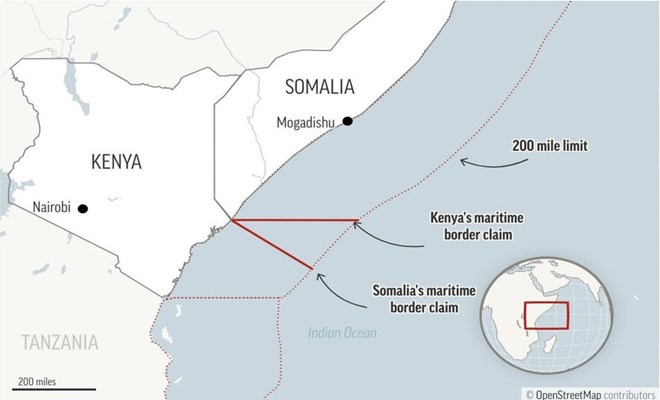
“The delivery of the Judgment will be the culmination of a flawed judicial process that Kenya has had reservations with, and withdrawn from, on account not just of its obvious and inherent bias but also of its unsuitability to resolve the dispute at hand,” said Kenya’s foreign office.
Nairobi has already granted exploration concessions to major European multinational oil and gas companies, including Italy’s ENI.
However, the court did reject Somalia’s claims for reparations, saying that Kenya’s conduct in the disputed area before the verdict did not violate international law.
Kenya also refused – at the 11th hour – to participate in oral hearings for the case in March.
Somalia initiated legal proceedings against Kenya at the international court in 2014 after it failed to solve the dispute after several meetings.
The court asked that both Somalia and Kenya accept the ruling and each other’s sovereignty.
The ICJ rulings are final and legally binding, meaning that Kenya cannot appeal. However, its enforcement relies on the Security Council. Several countries including the US and China have openly flouted the ICJ’s decisions in the past.
Read the entire 79-page decision HERE
South Sudan’s Deteriorating Finances
South Sudan’s Deteriorating Finances
Source: The International Crisis Group (ICG) published on 6 October 2021 a paper titled “Oil or Nothing: Dealing with South Sudan’s Bleeding Finances.”
South Sudan’s state finances are derailing it from the already fraught path to peace and stability after a brutal civil war. The regimes slush-fund approach to governance and winner-take-all politics helps explain why so much went wrong so quickly after independence in 2011. Much of the problem has been caused by the government’s mishandling of its oil wealth.
Labels: China, civil war, corruption, EU, IMF, oil, revenue, Riak Machar, Salva Kiir, sanctions, South Sudan, SPLA, SPLM, US
South Sudan’s Deteriorating Finances
South Sudan’s Deteriorating Finances
Source: The International Crisis Group (ICG) published on 6 October 2021 a paper titled “Oil or Nothing: Dealing with South Sudan’s Bleeding Finances.”
South Sudan’s state finances are derailing it from the already fraught path to peace and stability after a brutal civil war. The regimes slush-fund approach to governance and winner-take-all politics helps explain why so much went wrong so quickly after independence in 2011. Much of the problem has been caused by the government’s mishandling of its oil wealth.
Labels: China, civil war, corruption, EU, IMF, oil, revenue, Riak Machar, Salva Kiir, sanctions, South Sudan, SPLA, SPLM, US
Bihi: Somaliland will protect women’s business interests
Bihi: Somaliland will protect women’s business interests



Source: Hiiraan Online, Monday October 11, 2021
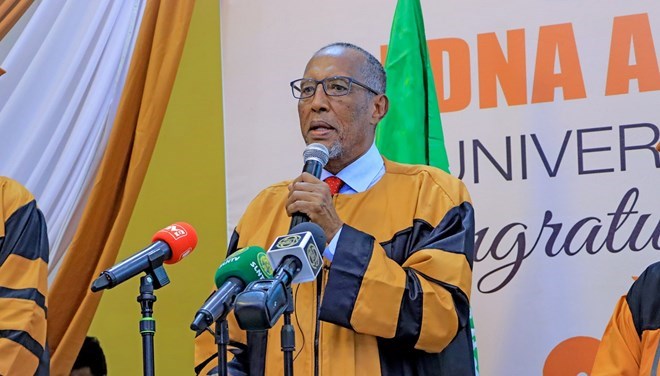
Hargeisa (HOL) – The president of the breakaway region of Somaliland, Muse Bihi Abdi, says he is defending the business interests of women.
Bihi Abdi said women were oppressed in Somali culture and that his government would do their part to empower them.advertisements”Women are oppressed when we (men) are in power. Our culture is still punishing women. I could not give them a third of what they asked of my government because of stiff opposition. There are many self-employed and educated people who are not given priority,” said Bihi.
He added that some men were attacking women business people, and he was defending and supporting them as president.
“women and men are equal before the law, health, trade, education and freedom. If they commit a crime, the nation has the right to arrest them. Just as a boy commits a crime, so can a girl.”
Somaliland’s president has sided with Layla Ibrahim Omar, who a day earlier told the media that a businessman was planning to destroy her restaurant and lounge in Hargeisa’s Kodbur district.
Upon receiving Layla’s complaint, the president held an emergency meeting with Layla and security officials, and authorities took the businessman into custody.
AU Security Council endorses joint AU-UN force to replace AMISOM
AU Security Council endorses joint AU-UN force to replace AMISOM




Source: Hiiraan Online, Monday October 11, 2021
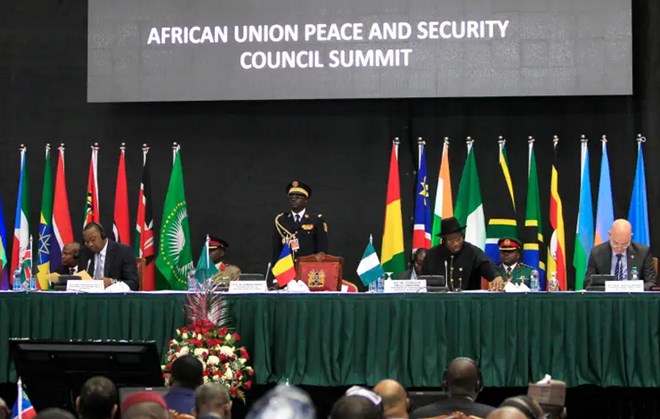
ADDIS ABABA (HOL) – The African Peace and Security Council adopted a proposal to deploy a joint AU-UN force to replace AMISOM by the end of this year.
Following a meeting last week, the Council said that it was adopting the AU-UN Multidimensional Stabilization Mission in Somalia, deployed under Chapter VII of the UN Charter, “which would ensure predictable and sustainable multi-year financing for the future mission, through UN assessed contributions.”advertisementsAn Independent Experts report in August proposed that the multidimensional force should take over from AMISOM, which the UN Security Council does not fund.
The African Union and Troops Contributing Countries (TCCs) have variously demanded the UN Security Council finances AMISOM as it is responsible for maintaining world peace.
The Council said that the security in the country was “worsening” and worried about a potential militant comeback.
“(The Council) expresses grave concern at the worsening security situation in Somalia, which has seen a worrying resurgence in the activities of Al Shabaab and other terrorist groups in large parts of the country and has detracted attention from the critical processes of state-building and stabilization.”
The Somali government has since rejected the proposal for the hybrid force but has not given its position. In the AU Peace and Security Council communique Sunday, the Council urged the AU, Un and Somalia to “finalize as a matter of urgency the joint report on the strategic objectives, mandate, size and composition of the AU-UN Multidimensional Stabilization Mission in Somalia.”
The AUPSC also raised concerns about the political deadlock between the nation’s top leaders.
“The ongoing political standoff between the Office of the President and the Office of the Prime Minister is contributing to the worsening security situation, as the political authorities find their attention distracted from governance matters,” the statement said.
The continental security body also called on the UN Security Council to allow for the rollout of the new mandate as discussions are still ongoing to prevent any security lapses during the transition.
AMISOM has been operating in Somalia for 14 years now, and its mandate is expected to conclude on December 31. Since then, the militant insurgent group Al-Shabaab has been pushed from Somalia’sSomalia’s capital but still exerts influence over large swaths of land in the south and central Somalia.
Dr. Hussen announces the launch of his book Denial of independence
Dr. Hussen announces the launch of his book, Denial of Independence




Source: Hiiraan Online, Sunday October 10, 2021
Dr. Hussen Announces the Launch of His Book, Denial of Independence: How the Four Powers and Italy Set up Somalia for Failure and Dismemberment
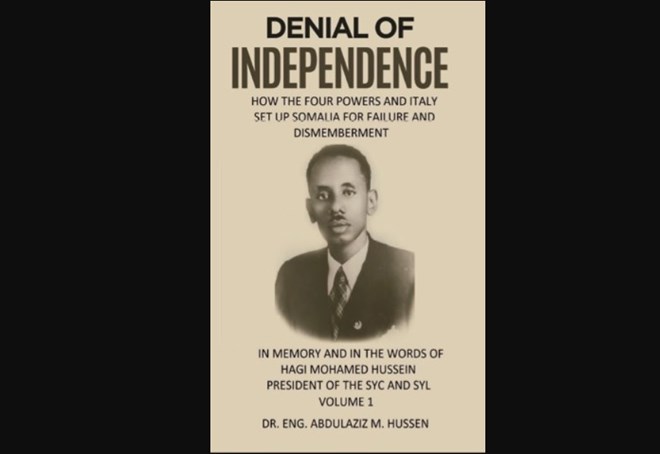
New York, New York – Dr. Hussen is pleased to announce that his book on the Denial of Independence: How the Four Powers and Italy Set up Somalia for Failure and Dismemberment has come out. At a time when the world is struggling to resolve postwar crisis, Dr. Hussen provides insight into what was done wrong in Somalia immediately after the war. He uses the oral account of his late father, Hagi Mohamed Hussein, leader of the anti-colonial movement in Southern Somalia, as well as material from the national archives in Italy, Britain, United States, and the United Nations.
Denial of IndependenceadvertisementsDr. Hussen attributes the causes of the Somali tragedy on the economic subordination left behind by Italy, the seizure of indigenous land, and using such land to grow cash crops thus depriving the country of its capacity to feed itself. He points out that the Italian use of the institutions of indirect rule, such as clan chiefs, notables, and elders held the country stagnant while the integration of the fascist-trained native militia forces, known as “banda” into the army and police force set the stage for instability. He adds that Italy left behind a system of government based on favoritism and corruption, playing one clan against another, only to prove how divided the Somali people were and how distant the prospect of a Somali nation.
While Italian colonialism bears much of the blame, so do the Four Powers who used the disposition of the former Italian Colonies to advance their strategic interests. And when the Four Powers could not agree among themselves, they passed the matter to a polarized United Nations, which not only denied immediate independence to Somalia, but threw her back into the lap of her colonial master, Italy, as trustee for ten years, contrary to the wishes and welfare of the majority of the Somali people.
Dr. Hussen graduated from the University of Rome with a Dottore in Civil Engineering. He completed the PHD Program in Traffic Engineering at the same university. He also has a Master’s Degree in Construction from the Southern Polytechnic State University in Marietta, Georgia. He worked extensively in Eastern and Central Africa as Project Engineer for fifteen years in the construction of roads, livestock isolation facilities, primary health care units, and schools.
Somaliland defends Las Anod evictions, says was informed by security considerations
Somaliland defends Las Anod evictions, says was informed by security considerations




Source: Hiiraan Online, Tuesday October 5, 2021
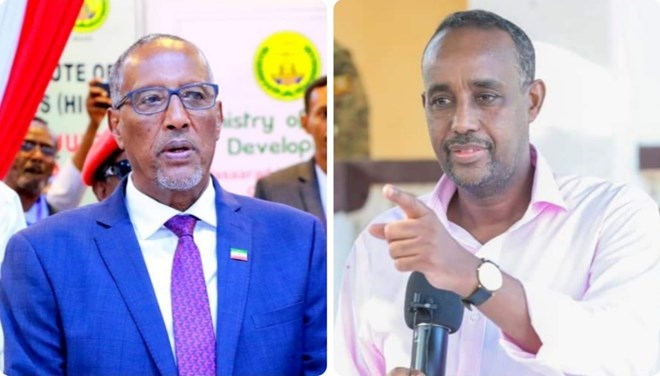
HARGEISA (HOL) – Somaliland has defended his decision to evict residents from southern Somalia noting the move was motivated by security concerns.
In a statement seemingly reacting to Somali PM Mohamed Roble’s castigation of the evictions, Somaliland said it acted in the best interests of its territory while scorning the Somali Prime Minister for overreach. The breakaway region accused Roble of ‘sharing unfounded information and baseless accusations.’
It added that the evictions were motivated by issues pertaining to security, including appeals from the local communities and authorities in Las Anod district.
It also said that Intelligence reports and consultations indicated that the selected individuals were putting the safety of the local population at risk but was quick to add that they were deported in a manner that did not infringe on their rights and without damage or loss of property or personhood.
The breakaway region further rebuked Somalia for what it termed as interference of its sovereignty and threat to its territorial security. PM Mohamed Roble said Tuesday the ‘deportation’ amounted to mistreatment of people in their own land.
“Expelling Somalis from a Somali territory is shameful, ugly and dishonouring,” he said. “Ordering people who have been peacefully trading to leave for simply originally coming from the southern regions is unfortunate and will be recorded by history.”
Meanwhile the UN and a Consortium of NGOs in Somalia has also weighed in on the evictions noting they ‘deeply regretted’ the decision by Somaliland to expell fellow Somalis from their own country.
The two sides urged Somaliland government against further evictions noting the move violated human rights.
Kenya’s Manda Bay now a naval base
Kenya’s Manda Bay now a naval base




Source: defenceWeb, Tuesday October 5, 2021
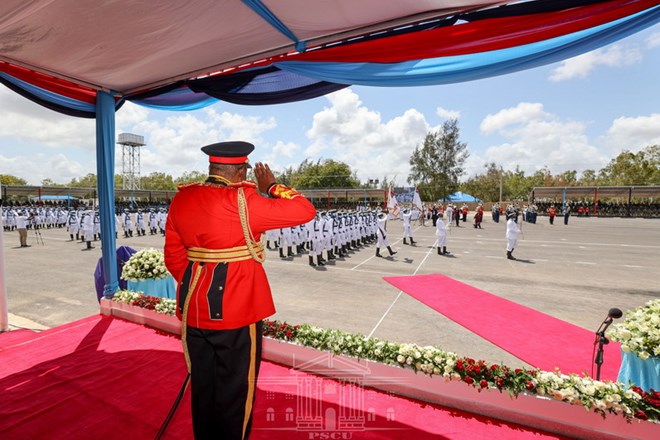
Kenyan President Uhuru Kenyatta has upgraded Naval Station Manda Bay to a naval base due to its strategic importance in enhancing counter-terrorism efforts and maritime security.
In a ceremony at Manda Bay on 23 September, Kenyatta said the military installation will now gain expanded operational autonomy as it sets out to become a more geo-strategic facility for national, regional and global security operations.advertisementsHe said the frontline military installation plays a critical role in defending Kenya’s sovereignty, maintaining territorial integrity, and securing the nation’s maritime borders.
“Given the growing investments in this part of our country and the promise of the maritime domain, Manda is an invaluable listening and watching tower for Kenya and Kenyans.”
In order to fulfil the country’s development agenda without external disruption, President Kenyatta said the expansion of the naval base’s operational autonomy was meant to establish a military installation with adequate capacity to respond to all forms of enemy aggression.
“The Kenya Navy Base Manda Bay is of utmost significance in enhancing counterterrorism efforts and maritime security, besides protecting the country’s port infrastructure. In addition, this base boosts security in the region and guards vital trade routes that are the lifeblood of international commerce,” Kenyatta said.
The Head of State singled out the Lamu Port-South Sudan-Ethiopia-Transport (LAPSSET) Corridor projects such as the new port, roads and other supporting infrastructure as some of the prized national and international investments that the military base is tasked to proactively protect round the clock.
“The LAPSSET project and road improvements from Hindi through Bargoni, Bodhei, Baure and Kiunga are ongoing. We are steadfastly committed to making the Boni area a peaceful and stable economic hub. Those infrastructure projects will support the livelihoods of our people within the region,” the President said.
He pointed out that emerging maritime security challenges require responsive multilateral approaches, saying Kenya will continue to actively engage with her partners to improve its naval capabilities, and assured that the Government will continue allocating adequate resources to the Kenya Defence Forces to enable them fulfil their mandate of securing the country’s interests.
Chief of the Kenya Defence Forces General Robert Kibochi said the Kenya Navy Manda Bay Base is a strategic installation recognized for its centrality in securing maritime trade in the Indian Ocean from the vantage Lamu archipelago.
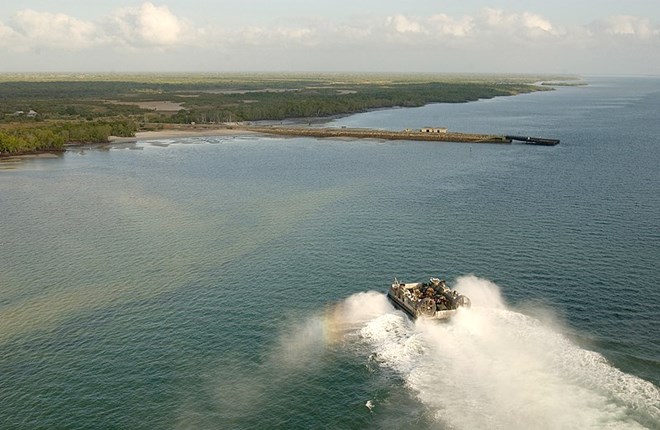
Kenya, Africa (Jan. 5, 2004) – An aerial view of a Landing Craft Air Cushion (LCAC 63) heading towards Manda Bay Kenyan Naval training area in Kenya, Africa. /US NAVY
He said the military base’s trauma centre, officially commissioned by President Kenyatta, serves local, regional and international multi-agency security operations in the area including AMISOM.
Manda Bay played a key role in the capture of Kismayu in Somalia by the Kenyan military during operations in September 2012. The FOB was crucial in planning during Operation Linda Nchi, a cross-border offensive against the Al-Shabaab who had been making regular trips into Kenyan territory and causing chaos.
The base is strategically located and has since 2010 been used as a launch-pad for major operations to counter terrorism and deter international crime.
During the 23 September ceremony, Kenyatta toured a monument and the site at the base where terrorists attacked in January 2020, resulting in the deaths of three Americans and an undisclosed number of Kenyan soldiers.
Kenya’s National Land Commission plans to acquire more than 5 000 hectares in Lamu and Tana River counties for the expansion of the base.
Manda Bay features a jetty, airstrip with 1.3 km runway, hangars, helipad, sickbay and trauma centre. Since 2004 it has been hosting a US government Forward Operating Location under operational control of the Combined Joint Task Force-Horn of Africa in Djibouti.
Ethiopia’s Tigray Conflict Lacks Willingness to Compromise
Ethiopia’s Tigray Conflict Lacks Willingness to Compromise
Source: Brookings published on 1 October 2021 a commentary titled “The Exemplary U.S. Sanctions Regime for Ethiopia’s Tigray Conflict and Its Limitations” by Vanda Felbab-Brown.
Both the TPLF and Ethiopian government remain entrenched in “their belligerent, uncompromising, and human-rights-violating policies” requiring tough love from Washington.
Labels: Abiy Ahmed, Afar Region, AGOA, Amhara Region, Biden administration, blockade, China, ENDF, Eritrea, Ethiopia, famine, humanitarian crisis, refugees, Russia, sanctions, Tigray Region, TPLF
Farmajo in Ethiopia to attend embattled Abiy Ahmed’s inauguration
Farmajo in Ethiopia to attend embattled Abiy Ahmed’s inauguration



Source: Hiiraan Online, Monday October 4, 2021
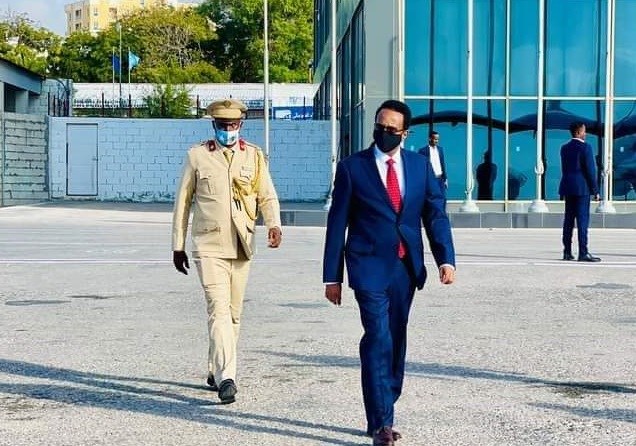
President Farmajo left Mogadishu on Monday for Addis Ababa to attend Ethiopian President Abiy Ahmed’s inauguration ceremony. CREDIT: OPM Somalia
Mogadishu (HOL) – President Farmajo left Mogadishu on Monday en route to Addis Ababa to attend the inauguration of Ethiopian Prime Minister Abiy Ahmed, following the latter’s landslide electoral victory earlier this year.
The president’s communication director, Abdirashid Hashi, confirmed Farmajo’s departure in a tweet.advertisements”President Farmajo has departed Mogadishu for Addis Ababa today to participate in the inauguration ceremony to form the new Ethiopian government. During the visit, the President will participate in the inauguration ceremony and meet with H.E. PM Abiy Ahmed.”
Farmajo was one of the first world leaders to offer his congratulatory message to Abiy Ahmed after the official results were announced in early July.
Farmajo will join Nigeria’s President, Muhammadu Buhari – who arrived on Sunday – along with other world leaders and foreign dignitaries to the ceremony.
The Ethiopian government has not published an official guest list.
Elections in Ethiopia were initially scheduled for August 2020, but Ethiopia’s parliament voted to postpone the election due to the COVID-19 pandemic.
In June, Ahmed’s Prosperity party was handed a resounding victory, winning 410 out of a possible 419 seats in Ethiopia’s federal parliament. However, the election was overshadowed by civil war in the Tigray region that has killed tens of thousands of people and has spilled out into other provinces. The conflict is irreparably damaged the once Nobel Price winner’s peacemaking credentials.
Addis Ababa sees Somalia’s President as a close ally and indispensable to Abiy’s broader political objectives in the region. The two leaders and Eritrean strongman Isaias Afwerki formed The Tripartite Agreement in September 2018 to strengthen economic and security ties in the Horn of Africa.
The agreement was initially lauded as a success by the international community, including the U.N. and the E.U.
It is not clear if the three will reunite in Addis Ababa on Sunday. There is no confirmation that Afwerki will attend Abiy Ahmed’s inauguration ceremony as his reclusive Eastern African nation is typically tight-lipped about foreign travel. Afwerki has travelled to Ethiopia in the past for meetings and similar high-profile events. Both Afwerki and Ahmed have come under intense international criticism for atrocities in the Tigray region. Ethiopia’s government initially denied that Eritrean troops were involved in the fighting against TPLF rebels, but Abiy Ahmed admitted to Ethiopia’s parliament in March Afwerki’s troops crossed over their border to fight alongside Ethiopia’s military.
Somalia has also been fingered as a possible belligerent in the Tigray war by the U.N.’s Human Rights Council in early June. The report alleged that Somali soldiers fought in Tigray alongside Eritrean troops, including accounts that the Somali forces had been involved in the intense fighting around Axum, where hundreds of civilians were massacred.
Reports that Eritrea had trained a covert force of Somali soldiers then sent them to fight in Ethiopia’s civil war reverberated across Somalia and caused outrage, despite Somalia have a notable history of training its forces abroad.
The Families of the soldiers protested in Mogadishu, Guriel and Galkayo, demanding answers from Somalia’s government. The anger was directed to Somalia’s intelligence agency which allegedly ran the recruitment, transport and training process.
Somalia’s latest constitutional crisis – which also has its roots in the Tigray conflict – began when a power struggle erupted in early September following the PM’s sacking Farmajo’s close confidante and nation’s spy chief Fahad Yasin for his reluctance to provide a report on the abduction and killing of Ikran Tahlil, a cyber security expert employed with NISA. Farmajo vehemently protested the firing but capitulated days later.
Several sources have revealed that Ikran may have been in possession of a ‘secret list’ that contained the names of the soldiers fighting in Tigray, although this has not yet been independently confirmed. A military tribunal has been tasked with investigating Ikran’s murder and hold those responsible to account.
Abiy Ahmed’s new term will see him govern Africa’s second-most populous nation for an additional five years. In that time, he will have to contend with the ongoing civil war and renewed international tensions against Sudan and Egypt over water rights in the region.
Abiy Ahmed will also have to fend off international criticism of his administration, which as grown significantly since his meteroic rise to power in April 2018. The U.N.’s Secretary-General Antonio Guterres criticized Ahmed this week following the expulsion of 7 U.N officials from Ethiopia. Ethiopia accused the officials of “meddling” in its affairs and giving them 72 hours to leave.
PM Roble off to Qatar amid escalating row with Farmaajo
PM Roble off to Qatar amid escalating row with Farmaajo




Source: Hiiraan Online, Monday October 4, 2021
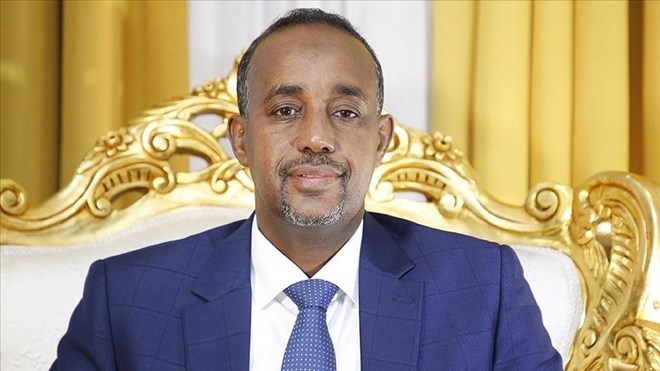
MOGADISHU (HOL) – Somali Prime Minister Mohamed Roble Monday departed for Qatar as President Mohamed Farmaajo flew to Ethiopia amidst an ongoing political tussle between the two leaders.
PM spokesman Mohamed Moalimuu said the visit which followed an invitation from
th Amir of Qatar, Sheik Tamim bin Hamad Al Thani, the Prime Minister of Somalia was aimed at strengthening the relations between the two ‘brotherly countries’.
advertisementsThe visit by Roble to Doha comes at a time his relations with Farmaajo remains strained. Qatar has had close ties with Farmaajo and his political henchman Fahad Yasin who is now serving as the National Security Advisor.
Sources said Qatar may have sought the audience of the PM to open negotiations on setting the long running row with Farmaajo.
Meanwhile Farmaajo is attending the inauguration of Ethiopian PM Abiy Ahmed who was reelected for a second term in July following controversial elections there.
Both Farmaajo and Ahmed have had close relations since the restoration of ties between the two countries in 2018.
Ethiopia’s PM sworn in for a second term as war spreads
Ethiopia’s PM sworn in for a second term as war spreads
Source: AP news, 2021-10-04,

1 of 5Ethiopia’s Prime Minister Abiy Ahmed is sworn in for a second five-year term, at the House of Peoples Representatives in the capital Addis Ababa, Ethiopia Monday, Oct. 4, 2021. The prime minister, the 2019 Nobel Peace Prize winner for restoring ties with neighboring Eritrea and for pursuing sweeping political reforms, now faces major challenges as war in the Tigray region spreads into other parts of the country. (AP Photo)
ADDIS ABABA, Ethiopia (AP) — Ethiopian Prime Minister Abiy Ahmed was sworn in Monday for a second five-year term running a country in the grip of a nearly year-long war, as a handful of visiting African leaders urged him to hold the nation together.
Abiy’s Prosperity Party was declared the winner of parliamentary elections earlier this year in a vote criticized and at times boycotted by opposition parties, but described by some outside electoral observers as better run than those in the past.
The prime minister, the 2019 Nobel Peace Prize winner for restoring ties with neighboring Eritrea and for pursuing sweeping political reforms, now faces major challenges as war in the Tigray region spreads into other parts of the country, deadly ethnic violence continues and watchdogs warn that repressive government practices are on the return.
The 11-month war is weakening Ethiopia’s economy, once one of Africa’s fastest-growing, and threatening to isolate Abiy, once seen as a regional peacemaker. Six African heads of state — from Nigeria, Senegal, Uganda and neighboring Somalia, Djibouti, Kenya and South Sudan — attended Monday’s ceremony.
“Today, more than ever before, we hope to see an Ethiopian nation that is at peace with itself,” Djibouti’s president, Ismail Omar Guelleh, told the crowd. “We all know how fragile peace is in our region. … We remain certain that the Ethiopian nation is bigger and stronger than whatever ails her.”
Kenyan President Uhuru Kenyatta added that “Ethiopia is our mother. If our mother is not at peace, neither can the family be at peace.”
Ethiopia’s government last week faced condemnation from the United Nations, the United States and several European nations after it expelled seven U.N. officials it accused of supporting the Tigray forces who have been battling Ethiopian and allied forces.
The government is under growing pressure as people begin to starve to death in Tigray under what the U.N. has called a “de facto humanitarian blockade.” Last week the U.N. humanitarian chief told The Associated Press that the situation in Ethiopia is a “stain on our conscience.”
The U.S. has threatened further sanctions if humanitarian access to Tigray isn’t granted soon and the warring sides don’t take steps toward peace. Thousands of people have been killed in the war.
As Abiy faces another term, “I think it will give the government the chance to renew its commitment to reform and to enhance the human rights situation in the country,” Amnesty International researcher Fisseha Tekle told The Associated Press. “They have a parliament which is dominated by one ruling party, so if they have the commitment, they also have the opportunity to do that.”
The results of a joint investigation into the conflict by the U.N. human rights office and the government-created Ethiopian Human Rights Commission will be released on Nov. 1, a few days before the war’s one-year mark.
An Update on Somalia’s Al-Shabaab
An Update on Somalia’s Al-Shabaab
Source: The Center for Strategic and International Studies published on 23 September 2021 a paper titled “Examining Extremism: Harakat al Shabaab al Mujihideen (al Shabaab)” by Jake Harrington and Jared Thompson.
This is an overview of al-Shabaab, its strategy and tactics, and its efforts to balance the often-competing goals of establishing an al-Shabaab-led government in Somalia and advancing the global al-Qaeda brand.
Labels: al-Qaeda, al-Shabaab, AMISOM, Ethiopia, ideology, jihadi, Somalia, terrorism, U.S. AFRICOM
Women and Girls in Somalia Continue to Be the Most Affected by the Humanitarian Crises
Women and Girls in Somalia Continue to Be the Most Affected by the Humanitarian Crises



Source: CARE
Thursday September 30, 2021
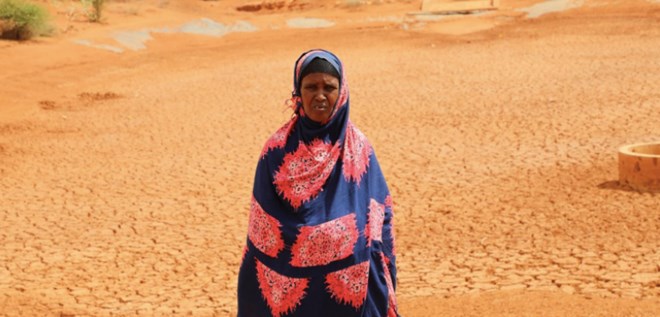
The CARE survey – carried out across five different administrative regions in July 2021 – shows that 77.5% of communities reported that ongoing drought was their biggest challenge, closely followed by COVID-19 (identified by 72%).
Halima*-a 32-year-old mother who was displaced by the 2017 drought lost her mother to COVID-19, her husband left home to look for jobs and never came back, leaving her to take care of their four children.
“The loss of my mother to COVID-19 was the most painful situation and now as a single mother with four kids and no support, it’s very hard to earn a living and look after my children… sometimes we eat, sometimes we stay hungry, this is how life is.” Said Halima
advertisementsAs a result of the drought and COVID-19 induced economic challenges, reports of girls dropping out of school and increase in cases of female genital mutilation have become more widespread.
Gender-based violence also remains pervasive, with 33.9% of women and girls living in settlements reporting sexual violence as their biggest concern, followed by inability to access services and resources (27.3%), then violence in homes (25.7%).
Hamda* a 24-year-old woman has been struggling to restart her business which was destroyed by the 2020 floods. The COVID-19 pandemic made it even more difficult for her as she was relying on support from her relatives who work abroad, due to global lockdowns, her relatives stopped providing support.
Hamda* said: “The combination of floods and COVID-19 has made life even more difficult, we need immediate support like food vouchers, shelter for the internally displaced people, capital for those who lost their businesses during the floods, health support and protection for everyone especially women and girls.”
The CARE survey also showed that entrenched gender norms continue to prevail in Somali society, with only 27% of the female-headed-households surveyed having received any form of formal education (compared to 41% of men).
It also highlights the inequalities that persist in gendered roles with over 60% of men and women surveyed responding that certain types of jobs such as nursing and cooking should only be carried out by women and that women cannot be strong community leaders.
CARE is calling for prioritization in supporting communities to start self-help groups and invest in augmenting existing women’s groups with livelihood trainings.
With the current drought and locust invasions that are threatening to deepen the crisis in an already fragile environment, there is great need for donor/government agencies to extend the much needed humanitarian assistance to the affected communities especially Internally Displaced Persons, pastoralists and vulnerable host communities.
*Names changed for protection reasons
Climate-related Security Issues along Sudan-South Sudan Border
Climate-related Security Issues along Sudan-South Sudan Border
Source: The Stockholm International Peace Research Institute published on 23 September 2021 an analysis titled “Abyei Offers Lessons for the Region on Climate-related Security Risks” by Kheira Tarif, Emilie Broek, and Katongo Seyuba.
The conflict in the Sudan-South Sudan border area of Abyei offers valuable lessons for UN peacekeeping operations on the importance of recognizing and responding to climate-related security risks. Climate factors complicate the security situation.
Labels: Abyei, border, climate change, migration, Misseriya, Ngok Dinka, peacekeeping, South Sudan, Sudan, UNISFA
Political stability in Somalia will help with women’s participation in political life: Chinese envoy
Political stability in Somalia will help with women’s participation in political life: Chinese envoy




Source: Xinuanet, Wednesday September 29, 2021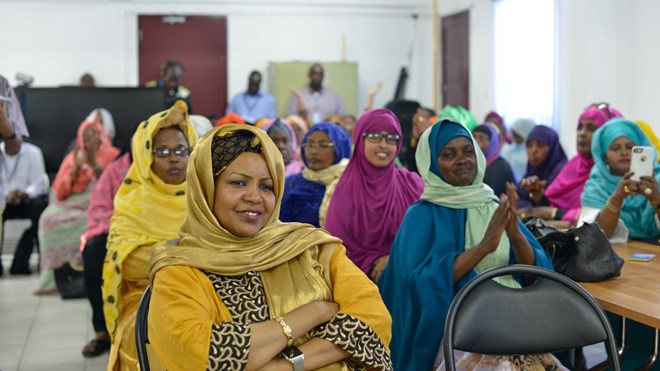
A Chinese envoy on Tuesday called for efforts to improve political stability and national unity in Somalia in order to boost women’s full participation in political life.
Women represent an important force in achieving lasting peace and building an inclusive society.
In recent years, the Somali government has made great efforts to protect women’s rights and interests, combat gender-based violence, and enhance women’s voice in political, economic, and social life, said Dai Bing, China’s deputy permanent representative to the United Nations.
China welcomes the Somali government’s commitment to guaranteeing women’s seats in the upcoming elections and the concrete measures taken to encourage women’s political participation, he told the Security Council.
advertisementsAfter a long period of war in Somalia, national reconstruction cannot be accomplished overnight. The international community needs to be patient, and encourages, in a step-by-step manner, greater political inclusivity in Somalia, he said. “Political stability and national unity in Somalia will help create favorable conditions for women’s equal, full and effective participation in political life.”
Dai expressed concern over the possible impact of the differences among Somali leaders on the political and security situation on the ground.
On Sept. 18, the Security Council issued a press statement, calling on Somali leaders to exercise restraint, put the interests of the country and people first, overcome differences through dialogue and consultation, and maintain political security and stability, he said.
“We believe that Somali leaders will heed the voices and wishes of the people and the international community by strengthening unity.”
China encourages the African Union, the Intergovernmental Authority on Development, and the top UN envoy for Somalia to continue their mediation efforts to bring the political situation in Somalia back on track, he said.
The most urgent task for Somalia right now is to hold elections successfully. China encourages Somalia to continue to advance the electoral process in accordance with the timeframe agreed on by all parties and resolve the outstanding issues through political dialogue.
The international community should continue to provide necessary financial and technical support for the elections in accordance with the principle of a Somali-led and Somali-owned process, he said.


